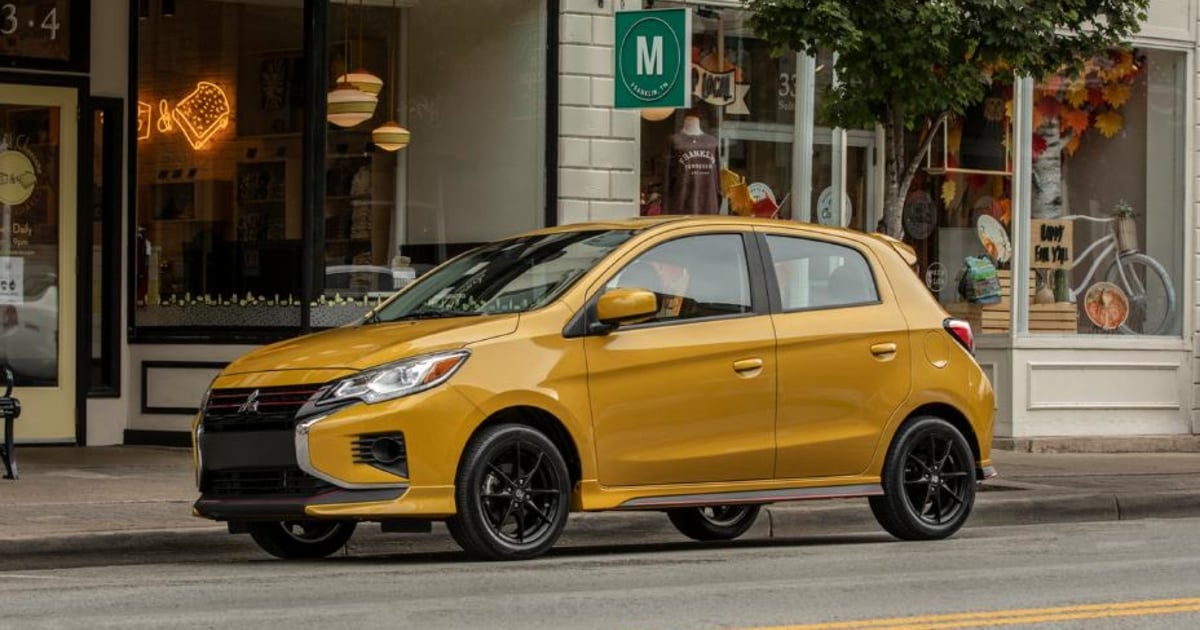
Mitsubishi Motors Corp. will ditch one of America’s most affordable new cars even as new-vehicle prices soar.
The Japanese automaker will halt U.S. sales of the Mirage, available as a four-door hatchback and a sedan, by mid-decade and exit the sedan market altogether, sources told Automotive News.
With a starting price of $17,340 including shipping, the subcompact has a singular selling point: efficient transportation at a bargain-basement price.
Cox Automotive said the Mirage was the only vehicle in the U.S. that transacted under $20,000 in July.
“The Mirage became the modern Yugo, a used-car alternative for people who desperately wanted a new car,” said Sam Fiorani, vice president at AutoForecast Solutions.
The move comes as Mitsubishi readies to remake — and electrify — its lineup with new and redesigned crossovers, including an Asian market subcompact crossover that could target Mirage customers.
Mitsubishi said it will introduce nine new electrified models globally during the next five years and plow $10 billion into electrified vehicles and battery production through 2030.
Mitsubishi Motors North America spokesperson Jeremy Barnes declined to comment on the future of the Mirage in the U.S.
“It’s a vehicle that we still see as having a role in our portfolio at this time,” Barnes said. “It fulfills the role of an entry-level vehicle.”
Mitsubishi joins Buick, Ford and Lincoln in abandoning sedans. Stellantis is phasing out the Dodge Charger and Chrysler 300, the last sedans in those two brands’ lineups, though it’s unclear whether they will be replaced with electric versions down the road. Production of the Mirage for the U.S. ends in late 2025, and a next generation is not planned, according to AutoForecast Solutions.
The writing was on the wall for Mirage after Mitsubishi dumped the nameplate in its home market of Japan.
In the U.S., Mirage sales tumbled 44 percent in the first half, and the vehicle ranks last in sales among actively marketed subcompact sedans. By year end, deliveries likely won’t reach half of what they did during its peak selling year of 2019, according to the Automotive News Research & Data Center.
Ivan Drury, insights director at Edmunds, said the death of the Mirage signals that even shoppers looking for an affordable vehicle in the new-car market aren’t willing to buy what is typically seen as a penalty box car.”
With its three-cylinder, 78-hp engine, the Mirage struggles to even compete with some used vehicles.
“The Mirage’s chief competition is a 3-year-old Toyota Corolla with more interior space and a better ride,” Fiorani said.
Even so, the fuel-efficient Mirage, which offers up to 39 mpg combined, helps Mitsubishi attract new buyers.
“People who never bought Mitsubishi before will consider the Mirage because of the price point,” said Chadi Moussa, CEO of Carnamic, which operates two Mitsubishi dealerships in the San Francisco Bay Area. “With its three-cylinder engine, it’s a car just to drive around locally.”
As Mitsubishi walks away from sedans, it is vowing to double down on crossovers with plans to bring two new models to the U.S. in the next few years.
“In the fiercely competitive crossover market, styling is becoming very important to differentiate one utility vehicle from another,” Fiorani said. “With its small lineup, Mitsubishi needs impressive styling to remain relevant with tough rivals from Honda, Nissan and Hyundai.”
Mitsubishi will replace its Outlander Sport subcompact crossover with the Xforce, a boxy compact utility vehicle that launches initially in Southeast Asia this year.
But the automaker has bigger ambitions for the Indonesia-made five-seat vehicle, which could see an electric variant in the future.
“We hope to grow the model from a vehicle for the [Association of Southeast Asian Nations] market to a global strategic vehicle, making it a core model,” Mitsubishi CEO Takao Kato said.
Analysts said the Xforce crossover will give Mitsubishi a more palatable entry model for the U.S.
“It is an illusion that Americans won’t buy sub-$20,000 vehicles; we just need them delivered in the right packaging, either an SUV or pickup,” Drury said. “Bringing a crossover to the market is a surefire way to get eyeballs.”
Mitsubishi could deliver its first fully electric model — a compact crossover — to the U.S. in 2026. It could be similar to the coupe-like crossover that will replace the Nissan Leaf mid-decade.
Farther out, Mitsubishi might bring an electric pickup to market. It would likely be built at alliance partner Nissan Motor Co.’s U.S. factories to avoid the 25 percent U.S. tariff on imported light trucks.
“There is demand for environmentally friendly pickups with shorter driving range,” Kato said. “So we would like to consider such possibility.”